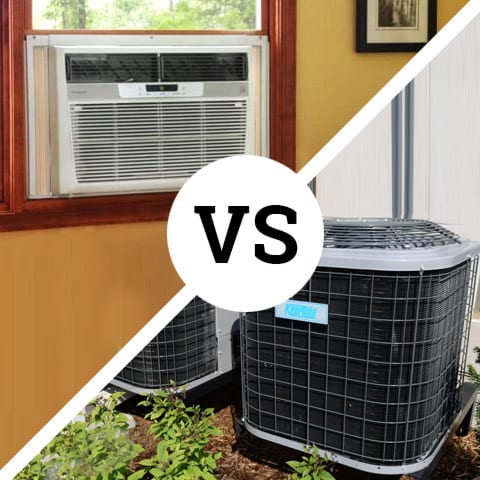With summer temperatures on the rise, many homeowners in the US are contemplating which air conditioning solution best suits their needs. Consumers face a familiar dilemma when choosing between central air conditioning systems and window units.
Today’s blog post will go over the primary differences between these two cooling options in terms of functionality, cost-efficiency, energy consumption, and more to help you make an educated decision.
If you decide to purchase central air conditioning, you’ll want to hire a professional to take care of the installation process. Even if you have previous experience with HVAC systems, you should never leave it to chance. Instead, you can get the best results by contacting IMS for AC installation, repairs, and maintenance.
Table of Contents
Functional Differences Between Central Air Conditioning And Window Units
Window units cool individual rooms, while central air conditioners cool entire homes.
Window Units Cool Individual Rooms
Window units, also known as room air conditioners, are a popular choice for homeowners seeking targeted cooling solutions. These appliances are designed to be easily installed in an open window or through a hole cut into the wall of individual rooms.
One advantage of utilizing window units is the ability to customize temperature settings on a room-by-room basis. For example, if you prefer your bedroom to be cooler than your living area or have some spaces that aren’t frequented often, controlling separate cooling zones can achieve desired comfort levels while potentially saving energy costs.
Additionally, these standalone devices give flexibility to those with limited space or tenants who cannot change their property’s HVAC system significantly.
Central Air Conditioners Cool Entire Homes
Central air conditioners are designed to cool the entire home by using a centralized system of ducts and vents. The unit is typically located outside the house, and it draws in warm air from inside while pushing out cool air through the ductwork.
The cooled air then circulates throughout the rooms via registers or vents. This process provides consistent cooling that can be adjusted room by room with a thermostat control panel.
One of the key benefits of central AC systems is they provide whole-house comfort without bulky window units taking up precious living space. Centralized cooling also improves indoor air quality compared to portable or window AC units because it filters out allergens and other particles from circulating in your home’s atmosphere.
Choosing Between Central Air And Window Units
While choosing between central air and window units, consider the size of your living space, cooling needs, and energy costs, and factor in the initial investment and long-term savings.
Evaluate The Size Of Your Living Space
One of the key factors to consider when choosing between central air conditioning and window units is the size of your living space. If you have a smaller home or apartment, a window unit can be a cost-effective option for cooling individual rooms.
It’s important to take measurements of your living space and consult with an HVAC professional to determine the appropriate size and type of system for your needs.
Consider Your Cooling Needs And Energy Costs
Before deciding whether to invest in central air conditioning or a window unit, it’s essential to consider your cooling needs and energy costs. Central air conditioners distribute cool air throughout the home, making them ideal for large homes with multiple rooms.
On the other hand, window units are better suited for smaller homes or single rooms that require spot cooling.
When evaluating your cooling needs, consider factors such as room size and layout, the number of occupants in the house, and how often you use each room. Additionally, look at your current energy usage patterns and evaluate which option will provide maximum efficiency while keeping you comfortable during the hottest summer days.
While central air conditioners may cost more initially due to installation costs, they tend to be more efficient in the long run than multiple window units running constantly.
Conclusion
In conclusion, central air conditioning and window units have unique benefits and drawbacks. Window units are ideal for cooling individual rooms, while central air conditioners are more efficient at cooling entire homes.
Homeowners should consider the size of their living space, cooling needs, energy costs, initial investment, and long-term savings when choosing between these two options.
Ultimately, whether you opt for a centralized system or room-specific units will depend on your personal preference and budget.

